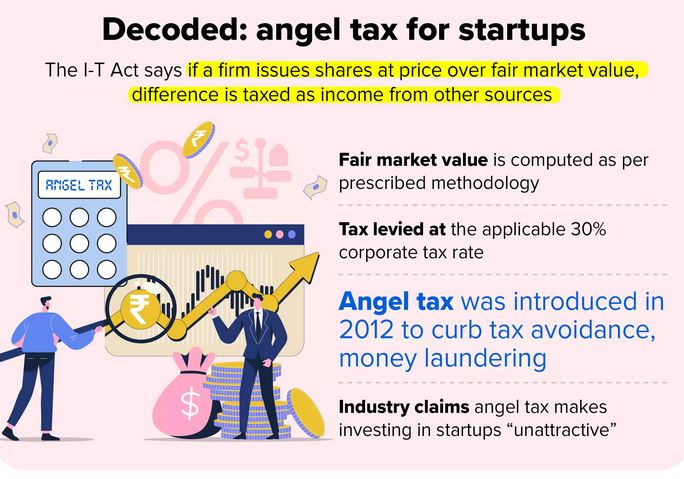Note4Students
From UPSC perspective, the following things are important :
Prelims level: Angel Tax

Why in the News?
Finance Minister announced the abolition of the angel tax, aiming to strengthen the startup ecosystem and support innovation in India.
What is Angel Investment?
|
What is Angel Tax?
- Referred to as Angel Tax, this rule is described in Section 56(2)(vii)(b) of the Income Tax Act, 1961.
- Essentially it’s a tax on capital receipts, unique to India in the global context.
- This clause was inserted by the Finance Act in 2012 to prevent laundering of black money, round-tripping via investments with a large premium into unlisted companies.
- The tax covers investment in any private business entity, but only in 2016 was it applied to startups.
Why was angel tax introduced?
- The complicated nature of VC fundraising with offshore entities, multiple limited partners and blind pools is contentious.
- There has been some element of money laundering or round-tripping under guise.
Details of its levy
- The Angel Tax is being levied on startups at 9% on net investments in excess of the fair market value.
- For angel investors, the amount of investment that exceeds the fair market value can be claimed for a 100% tax exemption.
- However, the investor must have a net worth of ₹2 crores or an income of more than ₹25 Lakh in the past 3 fiscal years.
Key Issues with Angel Tax
- Share Valuation: The tax impacted the valuation of shares, causing complications for startups in raising funds.
- Discounted Cash Flow (DCF) Method: Issues arose with the treatment of estimated figures in the DCF method, leading to disputes.
- Scrutiny of Funding Sources: The scrutiny of funding sources and investor credibility added another layer of complexity for startups.
- Retrospective Application: The retrospective application of the tax and its effect on the conversion of convertible instruments into equity were also significant points of dispute.
Significance for the Startup Community
- Startups has long advocated for a more supportive and less restrictive environment for fundraising.
- With this change, the government aims to create a more favourable atmosphere for innovation and investment in India.
| PYQ:
[2014] What does venture capital mean? (a) A short-term capital provided to industries. (b) A long-term start-up capital provided to new entrepreneurs. (c) Funds provided to industries at times of incurring losses. (d) Funds provided for replacement and renovation of industries. |
Get an IAS/IPS ranker as your 1: 1 personal mentor for UPSC 2024
